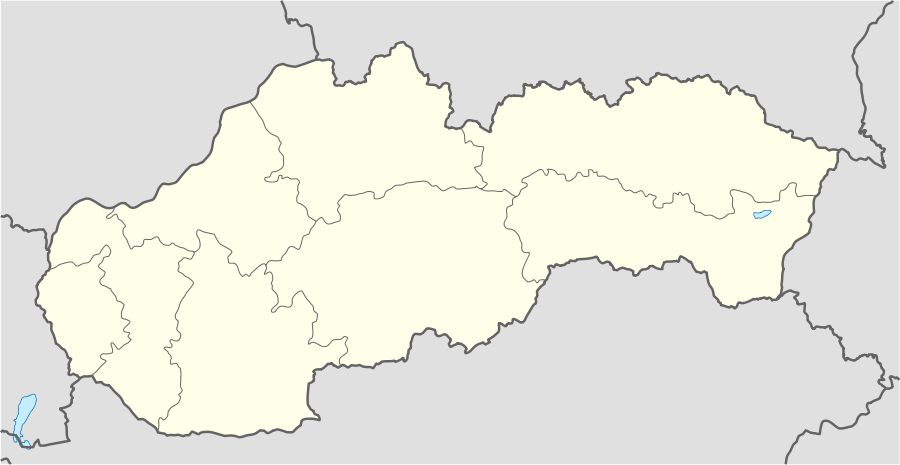List of World Heritage Sites in Slovakia
The United Nations Educational, Scientific and Cultural Organization (UNESCO) World Heritage Sites are places of importance to cultural or natural heritage as described in the UNESCO World Heritage Convention, established in 1972.[1] Slovakia ratified the convention on 31 March 1993 , making its historical sites eligible for inclusion on the list.[2]
First three sites in Slovakia were added to the list, with more to follow. As of 2019, Slovakia has seven sites inscribed on the list and a further 14 on the tentative list. There are two World Heritage Sites that are shared with other countries: the Caves of Aggtelek Karst and Slovak Karst with Hungary and the Ancient and Primeval Beech Forests of the Carpathians and Other Regions of Europe with 11 other European countries. Both of these shared sites are natural while the other five are cultural sites.[3]
World Heritage Sites
UNESCO lists sites under ten criteria; each entry must meet at least one of the criteria. Criteria i through vi are cultural, whereas vii through x are natural.[4]
| Site | Image | Location | Year listed | UNESCO data | Description |
|---|---|---|---|---|---|
| Bardejov | Bardejov, Bardejov District, Prešov Region | Cultural: (iii), (iv) |
2000 | [5] | |
| Caves of Aggtelek Karst and Slovak Karst* | 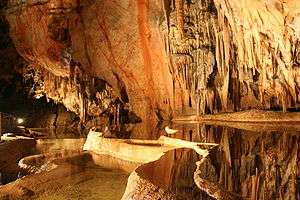 |
Rožňava and Spišská Nová Ves Districts, Košice Region | 1995 | Natural: (vii) |
[6][7] |
| Historic Town of Banská Štiavnica and the Technical Monuments in its Vicinity | 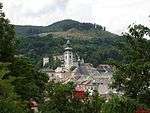 |
Banská Štiavnica and Banská Štiavnica District, Banská Bystrica Region 48°27′40″N 18°54′0″E |
Cultural: (iv), (v) |
1993 | [8] |
| Levoča, Spišský Hrad and the Associated Cultural Monuments | 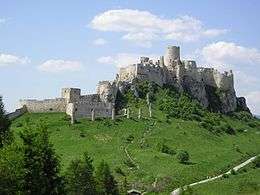 |
Prešov and Košice Regions | 1993[nb 1] | [9] | |
| Ancient and Primeval Beech Forests of the Carpathians and Other Regions of Europe* | 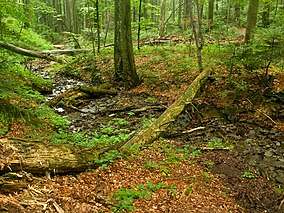 |
Prešov Region | Natural: (ix) |
2007[nb 2] | [10][11] |
| Vlkolínec | 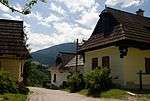 |
Ružomberok District, Žilina Region | Cultural: (iv), (v) |
1993 | [12] |
| Wooden Churches of the Slovak part of the Carpathian Mountain Area | 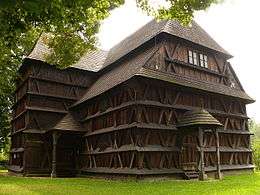 |
Košice, Banská Bystrica, Žilina and Prešov Regions 49°20′10″N 19°33′30″E |
Cultural: (iii), (iv) |
2008 | [13] |
Tentative list
In addition to sites inscribed on the World Heritage list, member states can maintain a list of tentative sites that they may consider for nomination. Nominations for the World Heritage list are only accepted if the site was previously listed on the tentative list.[14] As of 2019, Slovakia recorded 14 sites on its tentative list. The sites, along with the year they were included on the tentative list are:[15]
- Gemer and Abov churches with the medieval wall paintings (1995)
- Tokaj wine region (2002)
- Original Meadow - Pasture Sites of Slovakia (2002)
- The Memorial of Chatam Sófer (2002)
- Limes Romanus - The Roman antique monuments on the Middle Danube (2002)
- System of Fortifications at the Confluence of the Rivers Danube and Váh in Komárno - Komárom (2002)
- The concept of the lenticular historical town core of Košice City (2002)
- Natural Reserves of Tatras Mountain (2002)
- Karst Valleys of Slovakia (2002)
- Natural and Cultural Landscape of Danube Region (2002)
- Fungal Flora of Bukovské Hills (2002)
- Geyser in Herlany (2002)
- Sites of Great Moravia: Slavonic Fortified Settlement at Mikulčice – Church of St. Margaret of Antioch in Kopčany (2007)
- Ancient and Primeval Beech Forests of the Carpathians and Other Regions of Europe - extension (2019)
Notes
- Extended in 2009 to include Levoča and the Work of Master Paul in Spiš and name change from Spišský Hrad and its associated cultural monuments to the present name.
- Extended in 2011 to include the Ancient Beech Forests of Germany and name change from Primeval Beech Forests of the Carpathians to the present name.
References
- "The World Heritage Convention". UNESCO World Heritage Centre. Retrieved 7 July 2019.
- https://whc.unesco.org/en/statesparties/sk
- https://whc.unesco.org/en/statesparties/sk
- "UNESCO World Heritage Centre – The Criteria for Selection". UNESCO World Heritage Centre. Archived from the original on 12 June 2016. Retrieved 17 August 2018.
- "Bardejov". UNESCO. Retrieved 20 October 2011.
- "Caves of Aggtelek Karst and Slovak Karst". UNESCO. Retrieved 20 October 2011.
- "Decision - 32COM 8B.48 - Examination of nominations and minor modifications to the boundaries of naturel, mixed and cultural properties to the World Heritage List - Caves of Aggtelek Karst and Slovak Karst (HUNGARY / SLOVAKIA)". UNESCO. Retrieved 20 October 2011.
- "Historic Town of Banská Štiavnica and the Technical Monuments in its Vicinity". UNESCO. Retrieved 20 October 2011.
- "Levoča, Spišský Hrad and the Associated Cultural Monuments". UNESCO. Retrieved 20 October 2011.
- "Primeval Beech Forests of the Carpathians and the Ancient Beech Forests of Germany". UNESCO. Retrieved 20 October 2011.
- "IUCN Evaluations of Nominations of Natural and Mixed Properties to the World Heritage List" (PDF). UNESCO. pp. 111–120. Retrieved 20 October 2011.
- "Vlkolínec". UNESCO. Retrieved 20 October 2011.
- "Wooden Churches of the Slovak part of the Carpathian Mountain Area". UNESCO. Retrieved 20 October 2011.
- "Tentative Lists". UNESCO. Archived from the original on 1 April 2016. Retrieved 12 July 2014.
